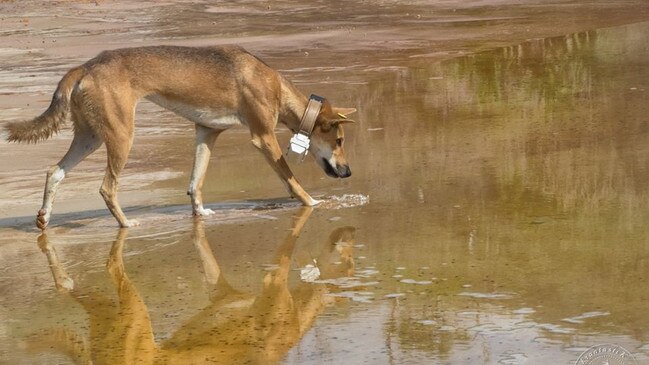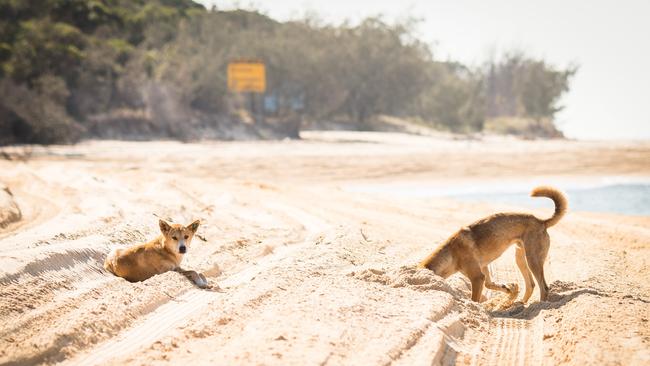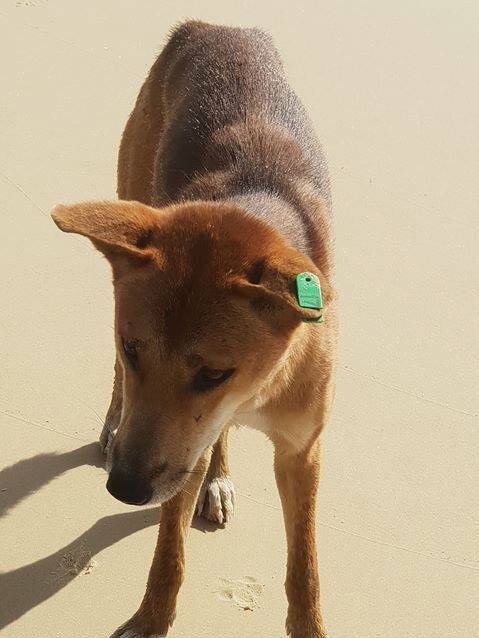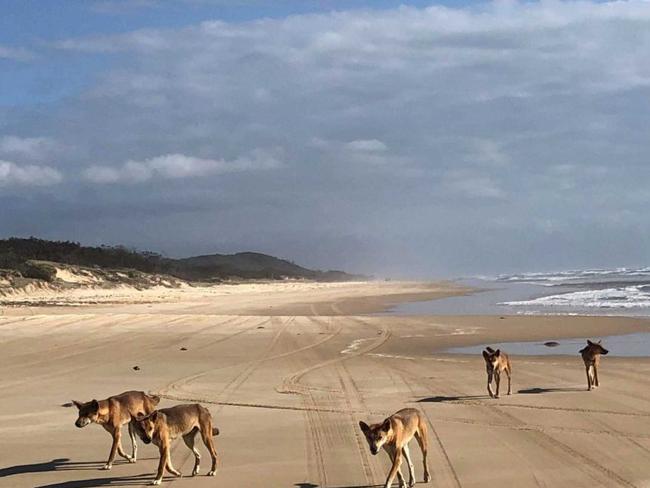‘People problem, not dingoes’: More fences, fishing rules recommended in Fraser Is review
Sweeping changes for the Queensland adventure playground of Fraser Island have been recommended after a major review of dingo dangers.
Fraser Coast
Don't miss out on the headlines from Fraser Coast. Followed categories will be added to My News.
More fences, tracking collars, dingo deterrent ‘sticks’, campground hosts and new rules for fishers dumping frames are among a raft of changes suggested for Fraser Island.
It comes after an independent review of the State Government’s management strategy for the island’s dingoes was carried out in the wake of attacks on children in 2019.
The review, led by Professor Paul Bertsch, found the behaviour of people remained the number one challenge.
In the report, Prof Bertsch described one of his visits to the island, during which he witnessed a habituated dingo loitering in the carpark of the number one attraction, Lake McKenzie, a dingo eating discarded fish frames near the holiday village of Eurong and a ranger speaking to a family about the danger of letting their children play in the dunes near a dingo.
A total of 43 recommendations have been made.
These include ear tagging for captured dingoes weighing less than 10 kilos following an assessment of their age, ear size and health and rolling out the use of collars on high-risk dingoes following trials that have already been carried out.
A recommendation to deliver an ‘aversion collar trial’ that would provide geospatial virtual spacing to separate dingoes and people was also included in the report.

“Significant time and energy have been put into reducing the risks of negative people dingo interactions through: infrastructure installation and management; ensuring people are aware of the risks; promotion of safe behaviour; monitoring; compliance; and reviews,” the report read.
“The Panel concluded that resources must continue to be allocated to these tasks.
“The major challenge is getting people to understand the issues, risks and consequences of their actions, gaining an understanding and appreciation of the cultural value of dingoes and demonstrating safe behaviour.
“The recommendations provide support and endorsement for many of the current management approaches in the Implementation Plan, while also identifying areas where greater focus is required, such as social science research to better understand human behaviour and motivations.”
The recommendations also backed the use of fencing on the island in collaboration with the Butchulla people.

Promoting the importance of visitors and residents reporting dingo interactions was also recommended.
So too was the expansion of areas where fish waste can’t be disposed and encouraging people to carry walking sticks on the island.
The importance of including the Butchulla people in delivering messages regarding the cultural significance of the island and its dingoes was also emphasised.
“In its deliberations the panel concluded that K’gari currently sustains a stable and healthy population of dingoes,” the review said.
“Research indicates that a range of natural food sources exist on the island helping to sustain this population. These foods include insects, birds, reptiles, rodents, swamp wallabies, bandicoots, plant material and marine strandings.
“The panel heard about the challenges the Butchulla People face in managing dingoes on K’gari.

“Historically the Butchulla People had a close relationship with tame dingoes and would like to maintain a strong connection to wild dingoes.
“This relationship will be a challenge with continued people – dingo interactions putting dingoes at risk.
“The panel noted that a continued management challenge is to prevent dingoes becoming habituated through repeated exposure to people.
“ This can lead to loss of their natural fear with unpredictable consequences including aggression.
“The major management goal is to keep people and dingoes safe, resulting in an improved relationship and positive experiences.”
Included in the independent panel was Jade Gould, director of the Butchulla Aboriginal Corporation, Queensland Chief Scientist Professor Paul Bertsch, Professor Hugh Possingham, chief scientist, the Nature Conservancy, University of Queensland, Dr Carly Sponarski, assistant professor of Human Dimensions of Wildlife and Fisheries, University of Maine, Professor Darryl Jones from Griffith University and Dr Rosemary Hill, senior principal research scientist, CSIRO Land and Water.
The State Government issued a response to the findings of the panel, saying that its current partnership with the Butchulla people was “integral to this success” when it came to executing the existing management strategy.
“It is understood that managing people remains the greatest challenge on K’gari,” the response read.

“Some people are making choices, such as deliberately interacting and feeding dingoes, which can have devastating consequences.
“Dingoes that have become habituated and lost their natural fear of people, can trigger a serious negative interaction.
“This demonstrates the need for a comprehensive management program as set out in the Implementation Plan.
“It ensures that a range of risk mitigation, education, collaboration, research and compliance actions are taken to help reduce the risk and keep both people and dingoes safe.”
The State Government response said face-to-face engagement had been demonstrated to be particularly effective in raising awareness of safety measures.

“The feasibility on the use of campground hosts, training and induction programs for tourism operators on the conservation and cultural values of dingoes and safe behaviours, and the use of champions to promote key messages, will be investigated,” it read.
“The Queensland Government partnership with the Butchulla People is at the heart of delivering a range of people safety, dingo protection and park management initiatives.
“This includes delivering collaborative projects such as additional fenced areas, the aversion collar trial and enhanced education.
“The department will also provide further upskilling opportunities to support ongoing Butchulla involvement in dingo management and public education.
“In partnership with the Butchulla People the Queensland Government will undertake further collaboration with commercial tourism operators, accommodation providers, island businesses, residents, visitors, and community and conservation island interest groups, to support the adoption, shared delivery and promotion of people and dingo safety initiatives.
“The goal being sharing and delivery of consistent and positive messages to a wider audience.”




